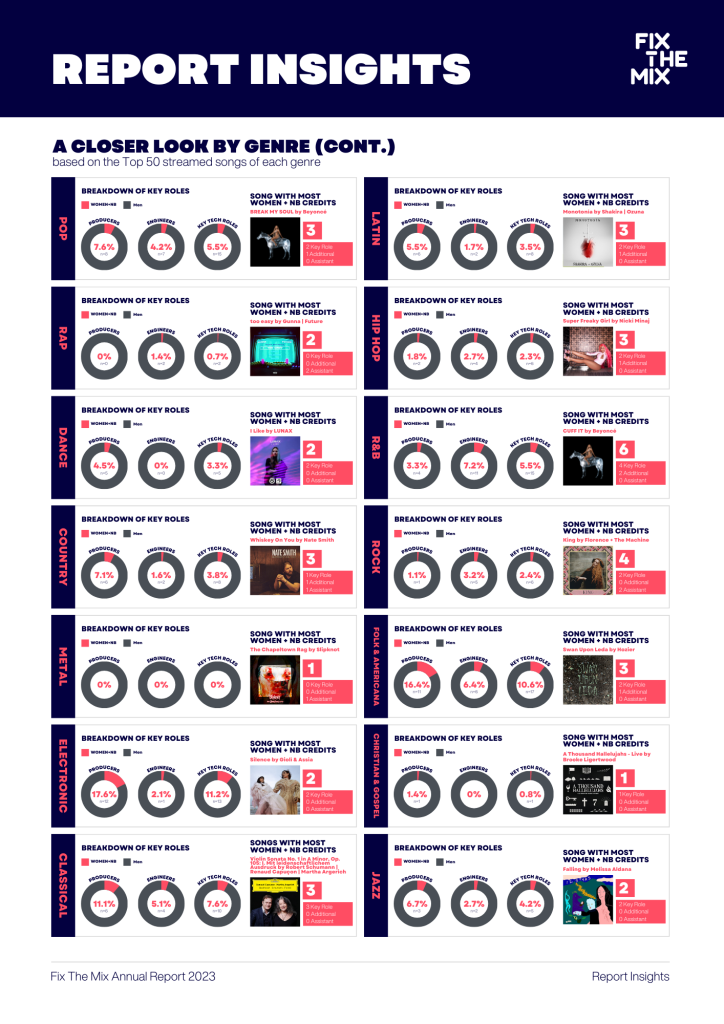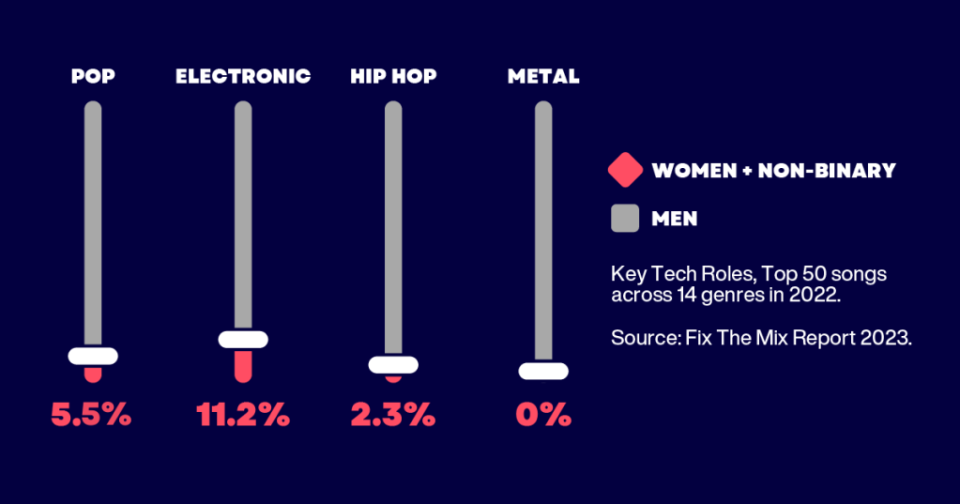Women and Non-Binary People Are Represented in Electronic and Americana Genres More Than Others, New Study Finds

A new study conducted in partnership with Middle Tennessee State University, Howard University, We Are Moving the Needle and Jaxsta has found electronic and Americana genres have the highest percentage of female and non-binary people holding in-studio leadership roles.
The “Fix The Mix” report examines gender representation — specifically, as it pertains to women and non-binary technical creators and professionals — across 14 genres deriving from top-of-the-chart playlists across major DSPs, the 65th Grammy Awards’ genre-specific categories, and the Recording Industry Association of America (RIAA) Diamond Certified List. The ultimate goal of the inaugural study aims to motivate major labels to expand their Diversty, Equity and Inclusion initiatives to usher in more women and non-binary producers and engineers.
More from Variety
This edition of the Fix The Mix report analyzes data from 2022 across a total of 1,128 songs. It regularly references the research conducted by the USC Annenberg Inclusion Initiative, which released six reports on the music industry spanning from 2012 through 2023.
In the January 2023 update, the Annenberg study found the percentage of female producers in 2022 was a mere 3.4%, while the percentage of female production credits tallied 2.8% across a sample of 1,700. The ratio of men to women producers across 800 popular songs was 34 to 1.
The Fix The Mix report reveals that the levels of representation for women and non-binary individuals vary significantly, ranging from 0% to 17.6% in specific sectors. Roles observed range from top-line roles of producer, engineer, mixing engineer, and mastering engineer, as well as additional production and recording roles including programmer, vocal producer, editor, and assistant roles.

“We’ve got such a long way to go to reach parity in the studio, but I know we can get there,” said Brandi Carlile, a We Are Moving the Needle soundBoard member. “This is a systemic problem in the recording industry that we cannot ignore any longer. I’m not sure everyone knows exactly where to start…but it begins with the courage to take a chance on someone who may not be getting recognized regularly in the field. We have to start somewhere. It’s no one’s fault and everyone’s fault at the same time. Even me. I urge my fellow artists and producers to make hiring decisions that work toward a more equitable future.”
Indeed, the report suggests that women and non-binary individuals are more likely to hold assistant roles than technical roles.
“While this higher concentration of women and non-binary people in assistant roles may indicate a growing pipeline of these contributors rising into key levels, it could be indicative of a glass ceiling preventing this demographic from an upward trajectory,” the report states. “The data suggests that they are qualified and present in the proper entry-level roles, but they are not advancing to the next level. This may be indicative of inequity around opportunities for advancement, underscoring the need for greater efforts to promote diversity, equity, and inclusion within the recording.”
Among the more positive findings, two chart-topping favorites regularly appeared as the silver lining in the report’s findings: Harry Styles’ chart-dominating “As It Was” credited 33% of women and non-binary people in assistance roles, while Taylor Swift’s “Anti-Hero” had 25%.
By genre, rap (0.7%) and metal music (0.0%) have the least representation of women and non-binary people credited as producers and engineers. On the flip side, folk and Americana genres tallied the most credits for women and non-binary people in both key technical roles of producer and engineer. The folk and Americana song with the most women and non-binary people credited in technical roles is “Swan Upon Leda” by Hozier with three credits.
Electronic leads as the most diverse in key technical roles (11.2%) across this report, thanks to its abundance of producer credits (15.5%).

By providing a closer look at the disparities by genre, “We hope this report will give decision makers the motivation and tools they need to make real change in their hiring practices so we can achieve gender parity in production, engineering and mastering roles,” commented co-author Emily Lazar, mastering engineer and founder of We Are Moving The Needle.
“It is difficult to fathom that representation remains so pitifully low in 2023,” echoed co-author Beverly Keel, Dean of MTSU’s College of Media and Entertainment. “In any other industry, these low percentages of the genres that have the best gender representation would be an embarrassment, so I hope these ‘high achievers’ are not resting on their laurels. There should be no pride in being the best of the worst. It should go without saying that the genres with the lowest representation should convene their leaders to quickly develop solutions to this problem.”
“We simply have to do better for women and non-binary creators in the industry” concluded soundBoard member and singer-songwriter Maggie Rogers in a statement. “It’s heartening to see more women and non-binary individuals enrolling in audio and production programs, and I’m dedicated to supporting their growth through organizations like We Are Moving the Needle.”
Best of Variety
Sign up for Variety’s Newsletter. For the latest news, follow us on Facebook, Twitter, and Instagram.

